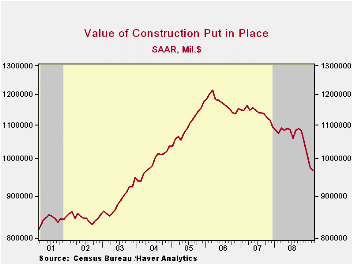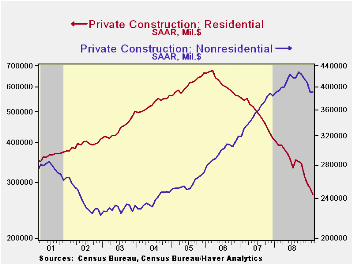 Global| Apr 01 2009
Global| Apr 01 2009U.S. Construction Spending; A More Moderate Decline
by:Tom Moeller
|in:Economy in Brief
Summary
Perhaps the worst news on construction activity has passed. However, the industry detail suggests not to count on it. The value of construction put-in-place slipped just 0.9% during February following three consecutive months of [...]

Perhaps the worst news on construction activity has passed. However, the industry detail suggests not to count on it. The value of construction put-in-place slipped just 0.9% during February following three consecutive months of decline in excess of 3%. Consensus expectations had been for a 1.7% drop.
A 0.3% increase in the value of nonresidential building activity was the source of the February surprise. It followed three consecutive months of decline between 1% and 4% which reflected the lagged effects of economic recession and the collapse of corporate profits. Those forces are ongoing. February increases in the lodging, health care, amusement and transportation sectors accounted for most of the overall increase in activity, but the gains made up at best half of the January declines. Spending on office construction was roughly flat after four months of sharp decline while the food/beverage, multi-retail, commercial, power and highways & streets sectors continued down.
Residential building activity continued its downward march with a 4.3% decline after the similar 3.7% January drop. Single-family construction activity fell another 10.9% and remained off by nearly one half year-to-year. Building activity on multi-family units also was weak (-11.2% y/y) though spending on improvements repeated the January gain and rose 1.9% (-6.9% y/y).
During the last twenty years there has been an 84% correlation between the q/q change in the value of residential building and its contribution to growth in real GDP.
Public construction edged up just 0.8% after two months of sharp decline. Again, the recession's effect on tax revenues may be taking hold. The level of activity for January and February was 1.8% below 2008. The value of spending on transportation facilities edged up just 0.8% (-4.7% y/y) after three months of sharp decline. Spending on highways & streets also fell for the third straight month (+3.0% y/y). The value of construction on highways & streets is roughly one-third of the value of total public construction spending.
The more detailed categories of construction represent the Census Bureau’s reclassification of construction activity into end-use groups. Finer detail is available for many of the categories; for instance, commercial construction is shown for automotive sales and parking facilities, drugstores, building supply stores, and both commercial warehouses and mini-storage facilities. Note that start dates vary for some seasonally adjusted line items in 2000 and 2002, and that constant-dollar data are no longer computed.
The construction put-in-place figures are available in Haver's USECON database.
| Construction (%) | February | January | Y/Y | 2008 | 2007 | 2006 |
|---|---|---|---|---|---|---|
| Total | -0.9 | -3.5 | -10.0 | -5.7 | -2.7 | 6.3 |
| Private | -1.6 | -4.0 | -15.0 | -9.8 | -6.9 | 5.5 |
| Residential | -4.3 | -3.7 | -29.8 | -27.7 | -19.8 | 1.0 |
| Nonresidential | 0.3 | -4.3 | -0.2 | 14.9 | 19.6 | 16.2 |
| Public | 0.8 | -2.4 | 3.4 | 6.7 | 12.3 | 9.3 |
Tom Moeller
AuthorMore in Author Profile »Prior to joining Haver Analytics in 2000, Mr. Moeller worked as the Economist at Chancellor Capital Management from 1985 to 1999. There, he developed comprehensive economic forecasts and interpreted economic data for equity and fixed income portfolio managers. Also at Chancellor, Mr. Moeller worked as an equity analyst and was responsible for researching and rating companies in the economically sensitive automobile and housing industries for investment in Chancellor’s equity portfolio. Prior to joining Chancellor, Mr. Moeller was an Economist at Citibank from 1979 to 1984. He also analyzed pricing behavior in the metals industry for the Council on Wage and Price Stability in Washington, D.C. In 1999, Mr. Moeller received the award for most accurate forecast from the Forecasters' Club of New York. From 1990 to 1992 he was President of the New York Association for Business Economists. Mr. Moeller earned an M.B.A. in Finance from Fordham University, where he graduated in 1987. He holds a Bachelor of Arts in Economics from George Washington University.
More Economy in Brief
 Global| Feb 05 2026
Global| Feb 05 2026Charts of the Week: Balanced Policy, Resilient Data and AI Narratives
by:Andrew Cates






